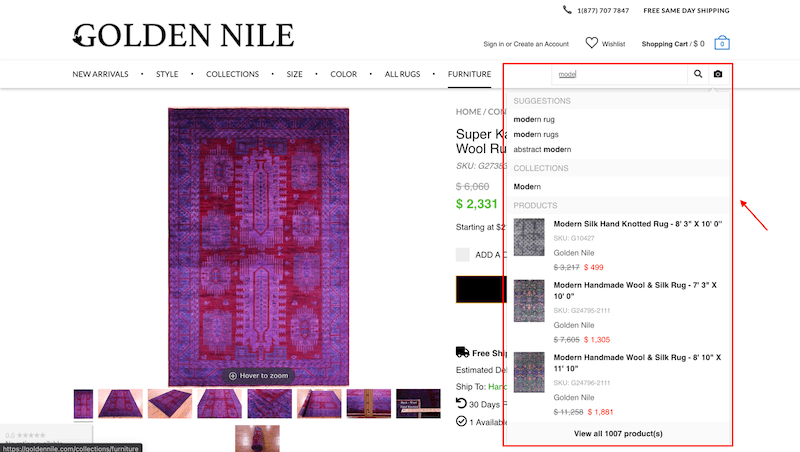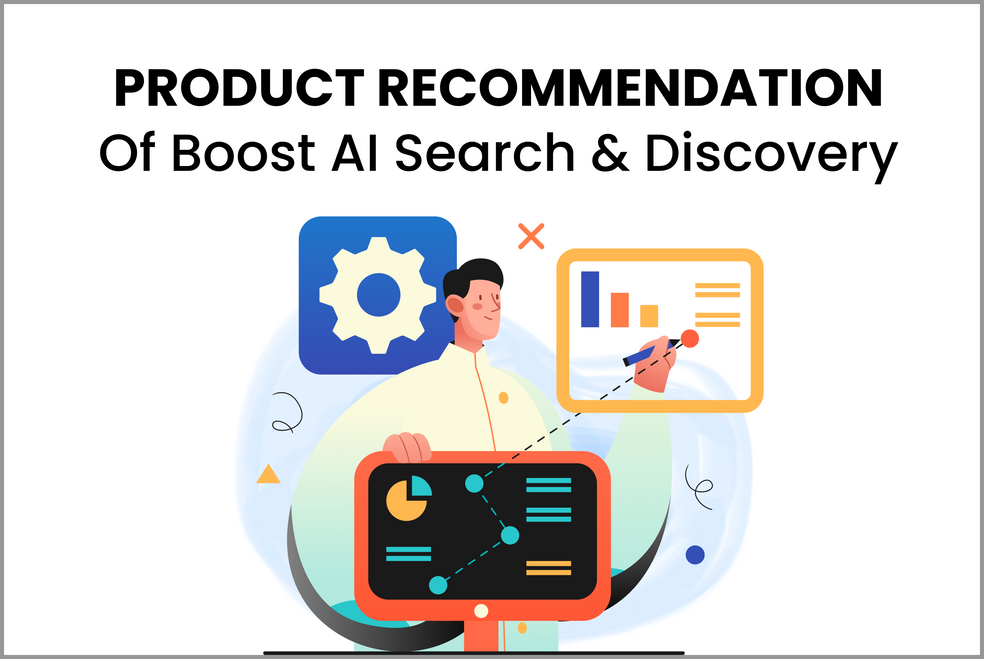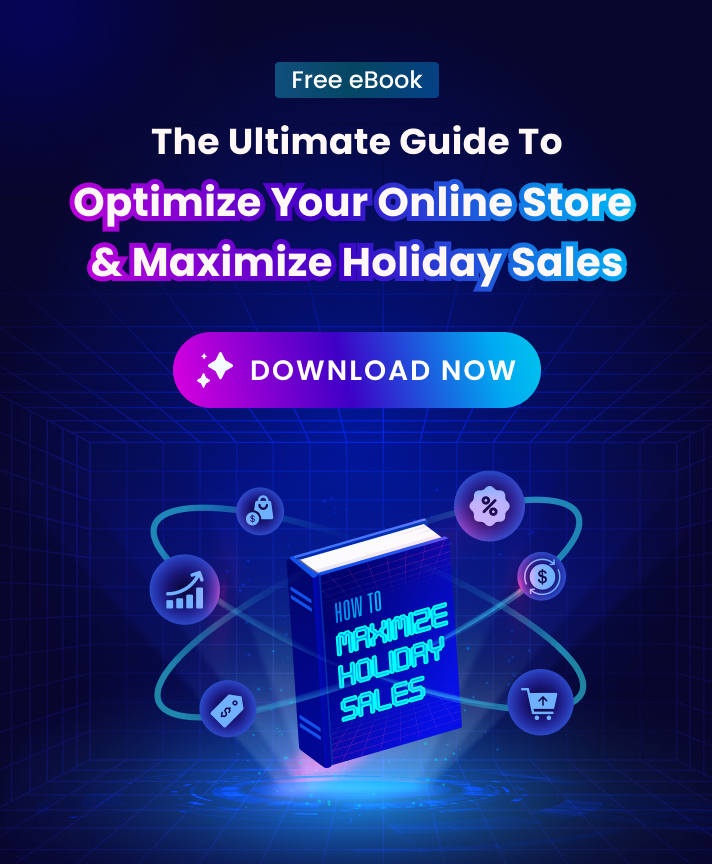What is Smart Search?
Smart search refers to search systems that use an intelligent algorithm. It offers enhanced features to improve the user experience by recognizing and returning results on relevant topics; finding synonyms; and determining phonetic similarities between letters and words to provide the proper result even if a keyword is misspelled.
In eCommerce, a smart site search goes beyond a search box. The smart search engine can assist you in auto-suggesting suitable products to your customers by responding to their inquiries as quickly as possible, drawing in new customers and enticing them to shop again.
Navigation, popular searches, intelligent autosuggest, autocorrect, synonyms, “Did you mean” suggestions, advanced analytics, natural language processing (NLP), smart ranking, personalization, and many more features should all be included in a full system.
Smart search Vs. Intelligent search
While smart search identifies and presents results on pertinent topics, intelligent search capabilities are what you get from a search engine that can “understand” user intent based on what the user types into the search box. It also goes by the names cognitive search and AI search, and it makes use of a variety of tools like machine learning and natural language processing (NLP) to comprehend the needs of each user. Once that has been determined, the appropriate search query results can be given.
How does Smart Search work?
The combination of the technologies mentioned above is what smart search uses to build the most accurate image of what the user is looking for. Smart search can infer meaning from the search phrases even if they aren’t exact point-and-click inquiries thanks to natural language processing. AI and machine learning work together to analyze signals to understand the context of a user’s search while taking into account their past behavior and how it can influence their future objectives. This is how businesses may equip customer care representatives to search their base of knowledge on the run for the resources they require to deliver excellent customer support, or they can use it to design highly personalized digital purchasing experiences that mimic the in-store experience.
The importance of smart search in eCommerce
You must therefore work on a variety of smart search features to ensure the smooth operation of your digital business. Still not convinced? The figures below, however, will persuade you otherwise.
- More than 40% of internet buyers start their searches there.
- Customers who use the search feature are 2.4 times more likely to make a purchase.
- The search experience has a nearly 39% influence on purchasing decisions.
Despite the fact that contemporary eCommerce search is a veritable money-making machine, 61% of eCommerce sites fall short of providing a satisfactory search performance.
Best practices to optimize Smart Search
You now understand how crucial it is to enhance your site’s search functionality if you want to see an increase in revenue. Here are the top things that all merchants should seek for once they are in the eCommerce game.
Various Types of Autosuggestions
E-merchants must display the most relevant suggestions in a drop-down search to increase search accuracy. Why? Whether you sell a single product line or thousands of items of a similar kind, this will provide your buyer an impression of the breadth of your product offering.
Now you know how important it is to optimize site search experience if you want to see a boost in sales. Once you are in the eCommerce game, here are the best features that all merchants should be looking for.



Products may be searched for by title, size, or SKU. Even if a customer cannot recall the rug’s full name, the auto-suggest dropdown will quickly finish the search.
Eliminate No Results Page
Nothing is more discouraging than an unsuccessful search. Even if the results that are displayed are not exactly what they are looking for, customers still want to see some results when they type something into your search box. The worst course of action is to let these customers leave your store in the dark.
However, identify common queries that return no results using your built-in analytics to deliver accurate decisions.
Take Golden Nile as an example here. Visitors can search products by title, size, or SKU. Even if a shopper does not remember the full name of the rug, the auto-suggest dropdown will complete the search query speedily.
Avoid No Results Page
Nothing is more disappointing than a search that brings up no results. When consumers type something into your search box, they expect to get some results, even if the displayed list is not exactly what they are looking for. The worst solution here is to leave these shoppers in the dark and let them exit your site.
However, to provide precise decisions, use your built-in analytics to identify common queries with no results.
Include Popular Searches
Use your search results to naturally draw attention to your highest-rated and most popular items. By presenting ideas for popular-suited products and queries, you may offer the consumer useful advice to make their task easier.
Utilize Long-Term Search
By enabling a search engine to understand the user’s search intent, long-tail semantic searches advance search technology even further. For instance, a search for “women long sleeve red tee size XL” is more likely to be unsuccessful than a search for “women t-shirts.” For potential customers, better search results are necessary, and a semantically-friendly site search will always perform better than plain text in terms of relevance.
Prevent Spelling Errors
Misspelled words could result in fruitless searches that reduce your income and lead generation. By utilizing predictive search, auto-complete, and spell checking, you can achieve a highly accurate and customized result while overcoming these tiny defects in search entries.
Utilize stop words to omit broad terms
When searching for products, your clients may use an extremely broad keyword (most of the products have it). In the end, irrelevant search results are displayed. The best course of action in this case is to use the stop word option to filter out a pointless keyword from search queries.
As an illustration, let’s say that you sell seasonal apparel goods under the brands Classy Outfit, Spring Trending Outfit, Fall Set Outfit, etc.
Customers who type in the term “spring trendy outfit” typically get results from the site search that include the words “spring,” “trending,” and “outfit.” As a result, customers may become overloaded with unnecessary products from other brands and leave your website. It is strongly advised to remove the search phrase “outfit” in order to prevent this.
Eliminating generic terms allows your website’s search engine to concentrate on the crucial keywords. As a result, it will provide quicker and more accurate results while assisting customers in finding their preferred options in a matter of milliseconds.
Mobile search optimization
These requirements must be taken into consideration when designing the mobile search experience because visitors are restricted by a small screen and filtering. A large, prominent search box, pertinent auto-complete, and quick delivery of results can all significantly enhance the shopping and search experience.
















